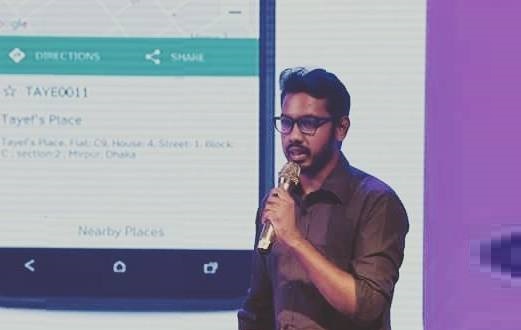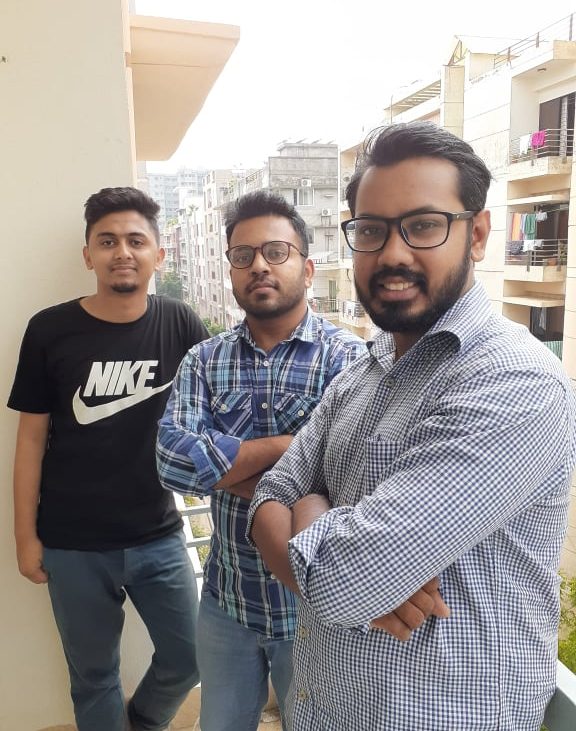
Barikoi Co-founder and CEO, Al-Amin Sarker Tayef, talks about his path to entrepreneurship, the germination of Barikoi, how it has evolved and found product-market fit, how they crafted the business model of Barikoi, the state of Barikoi’s business today, how the company operates, and its ambition going forward, reflects on his lessons from his journey so far and much more.
Future Startup: Could you please tell us about your background and elaborate your path to entrepreneurship?
Al-amin Sarker Tayef: I am a Dhakaite! I was born and brought up in Dhaka. I graduated from North South University at the end of 2015 with a degree in Computer Science and Engineering.
I have always been a curious child. While I always wanted to do something that could have an impact, I was not a very good student academically. Towards the end of university, I started applying for jobs and got selected for one of the top-rated software companies in the country. But it took them almost 6 months to finish the recruitment process. That’s about two semesters for me (I applied in the 10th semester). I realized that although it was okay for me since I was still a student, it has to be very frustrating for those who genuinely need a job.
I eventually turned down the job offer and started Unigigg - a career readiness and job application platform with a vision to bring down recruitment time and clear up the communication process. I stepped into my entrepreneurship journey with unigigg with zero industry knowledge and zero funding.
Future Startup: When and how did you get started with Barikoi? What motivated you to start Barikoi?
Al-amin Sarker Tayef: While doing unigigg, I got an offer from a family friend to help him build a motorcycle taxi company which was eventually named AmarBike. Since I needed funding to keep unigigg afloat, I joined Amarbike. Initially, we did very well with 5 bikes, doing 50-60 rides a day but there was a catch. We were losing 20-30 taka per ride due to inaccurate location and the way people gave out their addresses. I realized that location is an important aspect that no one was trying to fix and get a grip on. We conducted a small research on it and figured out that in early 2017 delivery men were wasting 5000 hours a day finding addresses and calling people for addresses.
The problem looked legit so I pitched to my co-founders Sadman and Reedwan, both are my friends and both are engineers. They hopped in and barikoi started.
We gave the name 'barikoi' as 'bari koi?' is one of the most used questions in Bangladesh and we planned to answer it more accurately than anyone else. We also applied to GPAccelerator and got accepted as a special team that would receive mentorship but not funding. GPA helped us in terms of networking that we still use today.
Future Startup: What went into building the initial operation of Barikoi? How did you put together initial investment and other things to get started? Please walk us through what the first few months of your journey were like and the challenges you faced.
Al-amin Sarker Tayef: We started as a B2C app. We were naive to think that people will adopt and input their own addresses. Obviously, that did not work. So we scraped off a lot of data from the web but the quality was poor. So we decided to do it on our own. We quickly built a data collection app and started testing for collection. At the time, Pathao was putting up a mapping team and we onboarded them as our first client. The deal was that we will help them to collect and verify data. Our initial investment was the revenue from Pathao.
We quickly put together a team and started walking from north to south and collected data of every address in Dhaka city. Our hypothesis was as we collect data we will learn a lot about the city that will help us in the long run. The hypothesis was true. We learned a lot about the city of Dhaka.
First few months I was looking at data collection, backend system development, and data verification all on my own. My partners were busy building our monitoring and data collection system.
We would monitor data collection from 6 in the morning till 10 pm in the night. Then we would match and figure out the errors, spelling mistakes of data. Every weekend we visited areas that were covered before to verify the quality of the data. It was very manual for the first year or so.

Future Startup: Could you please give us an overview of Barikoi in terms of services you offer, how many users you have, the size of your business, etc?
Al-amin Sarker Tayef: We are still at our very early stage. We soft-launched our API’s about 7 months ago. We currently offer 5 APIs to accommodate location-based companies such as e-commerce, logistics and 5 more APIs for our B2G clients.
The APIs are Search, Reverse Geocoding, Autocomplete, Nearby and Rupantor. If anyone wants to move from Google to a local solution they can use our APIs, which can be found here (https://barikoi.com/documentation).
Our current Hero Matric is the number of requests made to our platform and to find a stable market fit by piloting with different companies and making their cases a success.
Our services are very new for Bangladeshi E-Commerce and logistics companies therefore the adoption rate is slow.
The good news is we have found few interested companies who are willing to work with us and we are onboarding 2-3 companies every month.
Future Startup: From a product perspective, how does Barikoi work as a platform? How do you work with your partners? How does the tech part work?
Al-amin Sarker Tayef: Barikoi is a data platform, which means we collect, store, analyze location data and peripheral data then productize them and serve them using an API. Our product concept is simple, anyone who needs location data or location-based data can easily plug and play with our API and reap the benefits similar to google maps platform, Mapbox.
As a local company, we go the extra mile to help our partners to support them and make their case a success. To do that we sometimes have to do minor customizations on request.
Our tech part is very interesting as we solve problems very specific to Bangladesh. We have built a lot of tools/products/tech from scratch. For example, to identify data loops we need a system where we can visually verify or update our data. So we have built barikoi “Drishty” - a google street view alternative which will be updated frequently as opposed to google maps which as last updated in 2013.
We have built an AI-based Address transformer called “Rupantor '' which transforms bad addresses to a standard address. Rupantor is one of a kind tool in the world developed by Bangladeshi people for Bangladesh.
Future Startup: What is your business model? How do you generate revenue?
Al-amin Sarker Tayef: Our model is simple. We charge per API request made to our platform for our B2B users and yearly contract basis with B2G.
Future Startup: How big is your team? Could you tell us about your culture at Barikoi?
Al-amin Sarker Tayef: Our current team size is 12 out of which 8 are engineers, 1 in admin and 3 in the field team. We believe in doing extraordinary things in small packages. We hack the norms to make sure that it can be done in-house.
For example, we are the 6th company in the world who built something like google street view, without a solid culture even though it is tough to even initiate something like that. We believe everything is possible with a strong will and dedication.
Future Startup: On average how many customers do you serve per month? How have you attracted customers and grown Barikoi? Could you tell us about the strategies and activities that you carried out to achieve the growth?
Al-amin Sarker Tayef: We currently do 150k API calls a month on an average which is growing at 50% monthly and expected to grow by 200% a month within Q3 of 2020.
Our current approach is to pitch directly to our potential users, show them the value and benefits and onboard them. For example, you don’t currently see autocomplete in any of the e-commerce but soon you’ll see the feature in well-established E-commerce checkout forms. This is new for the country so one-on-one pitch works best.
Future Startup: What are the lessons you’ve learned in terms of growing a business? What other entrepreneurs can learn from your growth journey?
Al-amin Sarker Tayef: Grit and realization of problems are important. If you solve a problem, it gets to a product-market-fit, if you don’t solve a problem then it will not.
People need to understand that not every product has the same market adoption rate so being gritty and patient will help to the only iterate and grow the business.
Future Startup: Have you raised investment? If so, how much have you raised? What are the plans now? What does it take to raise investment? What should founders, who are trying to raise investment, be mindful of?
Al-amin Sarker Tayef: We have raised a small pre-seed round in mid-2018, we have good support from Startup Bangladesh as well. Our current plan is to make the market adopt our API and expand into the divisional cities of the country.
At the early stage, I think it’s the founder and the potential of the team that matters more than anything else. People will talk about market size, TAM, SAM but at the start, it’s the founder and their vision because the market can expand dramatically over time but one needs to be able to articulate it at least verbally and meaningfully.
Future Startup: How does your sales and marketing work?
Al-amin Sarker Tayef: We do one to one sales. We will start marketing to our target market which starts with developers. We will be doing hackathons and knowledge sharing events in the upcoming months for marketing.
Future Startup: What are the goals for the future?
Al-amin Sarker Tayef: We want to be the backend of every company that needs location data and location analytics services in the future. We will get into KYC, real-estate, tourism industry one by one as it helps us to enrich our data.
Future Startup: Have you found anything particularly helpful or advantageous in the process of building Barikoi?
Al-amin Sarker Tayef: Having a co-founder and mentor is important. As a founder, you’ll go through a lot that you can share with your co-founders. A mentor can help to navigate difficult situations. A mentor can also help to build the network which helps in the long run in building the company. I found these insights very helpful in the process of building barikoi.
Future Startup: How do you deal with challenges and stress that come with being a founder?
Al-amin Sarker Tayef: I find reading books and reaching out to fellow founders or mentors most helpful.
Entrepreneurship comes with a lot of challenges and new challenges arrive every other day which leads to stress. Therefore talking about it, reading about it helps to navigate through the tough situations.
Future Startup: What advice would you give to founders who are just starting out?
Al-amin Sarker Tayef: A lot of people will advise you and push you to do things that you would feel uncomfortable with.
If you don’t feel comfortable doing something, don't do it. Do what you want to do and be patient. The dots will connect as you keep iterating!
